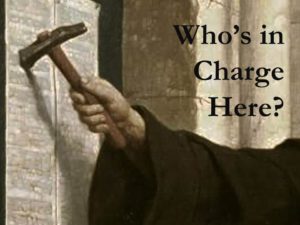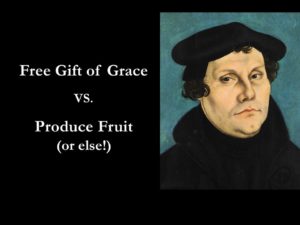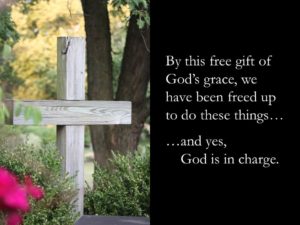Who’s in charge here, I wondered, as yet another horrific, mass shooting happened in Las Vegas this week. In times like these we need to be reminded, constantly, that God is at work in the midst of the world – reminded that God doesn’t ever give up on trying to reach us with God’s grace and mercy.
My grandfather was one of the most generous people I have ever known. An incredibly faithful steward of all that he had. Generous with his time, his money – to family, his church, to colleges and seminaries and to be honest, to many other places and people that only he knew about. An incredible model for the generations to come in his family and for all those who knew him.
That is not to say that my grandpa was perfect. In his 70 year career as an accountant and treasurer of many businesses and organizations, he had gotten pretty used to being the decider, the one who was in a position to call the shots. He was driven and he was a leader.
Toward the end of his life, Grandpa developed congestive heart failure and lived with that condition for quite a while, even continuing to work three days a week, complete with an oxygen tank in the corner of his office. However, when it became apparent that his life was drawing to an end, he made all the preparations, called his two sons and their spouses together to let them know his wishes and his plans for his estate. He checked all the boxes. He was prepared and methodical.
When the time came, he arranged for an ambulance to take him, not to the hospital nearby, but to the one an hour away, close to where he had been born and raised and had lived the majority of his life. He was determined that that was the place where he would breathe his last.
While this was happening, my parents were called and they drove up to Minnesota to be with him. The following night Grandpa said his final goodbyes to his family and drifted off to sleep. That same night, my mother decided that she would take the overnight shift – she didn’t want her father-in-law to be alone in his final moments.
Early the next morning, Grandpa’s eyes opened, he looked around the room, looked at my mom and guess what? He was not happy. He was actually downright angry. After all, he had made his peace. He had said his goodbyes. He had decided that that night was his time to go and be with God and he was not happy that his wishes had not been honored – but this was one decision that was above his pay grade.
It turns out, he wasn’t far off, it was only a couple of days later that his body finally did give out and Grandpa passed onto eternal life. But I will never forget both his faithfulness and generosity and his stubborn willfulness too. Traits that made him who he was.
Who’s in charge here? That is the question that made me think of my grandfather’s story.
Who’s in charge here? I wondered as we heard the horrific news out of Las Vegas this week and then all of the survivor stories full of tragedy and chaos and grief. I saw a comment that called this the worst mass shooting in U.S. history, and then in parenthesis it said, “until the next one”.
Who is in charge here?
This is also the question that Martin Luther was essentially asking too. As we draw closer to the 500th Anniversary of the start of the Reformation, I am mindful of the struggles that Luther had with authority on all kinds of levels.
Certainly, when he wrote and posted his 95 Theses to the door of the Castle Church in Wittenberg, he was calling out the Pope and the hierarchy of the church – reminding them that God is in charge – calling them back to the core of scripture and the work of Christ.
While we mark and remember that monumental day and the historical upheaval that came about as a result, Luther’s struggle with the question of “who is in charge” goes much further back.
And actually, his struggle wasn’t so much with who was in charge, but with the temperament of the one in charge, namely God’s temperament. Luther was convinced that he could never live up to God’s expectations for him and that because of that, God’s anger and wrath would be forever turned against him. He was unable to grasp the concept of a loving God, of a God who was merciful and slow to anger.
As far as Luther was concerned, whatever he did, however much he did, it would never be enough. Ever. And he truly began to hate God because of it. But Luther continued to study and wrestle and in that struggle Luther stumbled upon grace, upon the work of Jesus.
This was the quintessential light bulb moment – from that point on, Luther scoured the scripture for evidence of God’s grace and he began to see it everywhere and from then on everything changed for Martin Luther.
I always enjoy conversations about grace that often happen in the confirmation ministry. For students the idea of grace and eternal life being a free gift from God with no strings attached is kind of mind-blowing, and it often leads to the question. So, if grace is free, then do I really have to be good? Now, that’s a real question.
The answer is both No and Yes.
Luther, in essence, changed the equation for us. He began his life with not only do you have to be good, but you actually need to be perfect and then Luther would despair and become angry because obviously nobody can be perfect.
But when Luther discovered grace, it all shifted – in order to receive God’s grace, you did not have to be perfect, in fact you didn’t have to do anything – grace is a gift freely given. However, that grace, in effect, frees us up to live our lives in response to that freely given gift.
The more we understand and recognize this gift of grace from God, the more we desire to live generous lives – to join God in building a just world – to share that grace and love and mercy that has been freely given to us.
The tenants that had been entrusted with the vineyard in Jesus’ parable from Matthew today – the tenants clearly did not recognize the gift of God’s grace, nor did they given any credence to the one who was in charge. Instead, they thumbed their noses at all of it.
This parable becomes a bit of a paradox for us. It becomes Luther’s idea of God’s Free Gift of Grace vs. Produce Fruit (or else!).
What we discover is that God, just like the landlord, doesn’t give up easily in trying to reach us – sending person after person, even to the point of sending his own son to make that connection, to remind us of who is in charge.
To remind us that we have been freed up for a purpose – to produce fruit – to shine God’s light of grace, to be the arms that hold the one who is grieving loss, to be the feet that bring a word of comfort and hope, to be the hands that deliver the meal, the cold cup of water, the warm hat and gloves – to be those who embody the flesh and blood, the very presence of Jesus in the world.
By this free gift of God’s grace we have been freed up to do these things – and yes, as witnessed by my Grandfather and by Martin Luther and countless others who have come before us and will come after us, God is in charge.
Amen.
Rev. John Berg
Gloria Dei Lutheran Church, Northbrook, IL





